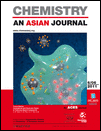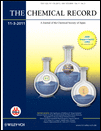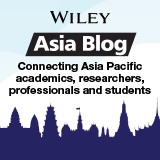第1回、第2回に続き、化学ジャーナルの編集長から当ブログに特別に寄稿された「論文執筆・投稿にあたって留意すべきポイント」の最終・第3回分を掲載します。寄稿してくれたのは、Chemistry - An Asian JournalのEditor-in-Chief, The Chemical RecordのManaging Editorを務め、日本人からの投稿にも数多く目を通してきたWiley-VCHのDr. Brian Johnson @chemistrybrian です。
-
Conclusion section: I have once seen a Full Paper in which the conclusion section consisted of about five paragraphs and covered nearly one whole page. In the middle of reading this section, I realized that the author was not really sure what was learned from the work or even why it was carried out. Many referees and readers in general give high priority to a good conclusion section that concisely tells the reader what was gained from the study and data. Furthermore, a promise in this section of “potential applications” is strongest if it is concrete and realistic.
-
Cover suggestions: Submitting a cover suggestion does not affect the peer review process, but it is an excellent way to highlight your work. Readers enjoy visually attractive science and are often drawn into an article that they otherwise might have skipped. For cover suggestions that are not chosen for the cover, many journals offer other great ways to feature your artwork: for example, through inside covers, back covers, or frontispieces.
-
Choice of journal: Choosing a journal for your work comes down to which readership you wish to reach. Many authors ask what we editors mean when we direct work from a journal with a heterogeneous readership to a more specialized journal. A simplified way to look at this is: If a reader sees a manuscript that covers a topic that is far removed from his expertise, will he appreciate the paper’s significance? If this is likely not the case for a particular manuscript, the manuscript is often recommended to a more specialized journal. But this is not a bad thing at all. A Board member in our group of journals has recently emphasized that young scientists build their reputation best through good Full Papers in specialized journals.In the age of electronic publishing, the overall visibility of your work is vital, and choosing good international journals obviously helps you gain a wider readership. Your choice of journal can have other consequences as well, such as the positive effects of publishing with a society journal. For example, the Chemical Society of Japan has an outstanding family of international chemistry journals: Chemistry Letters, Bulletin of the Chemical Society of Japan, The Chemical Record, and Chemistry-An Asian Journal. The papers that you publish in these journals are not only disseminated worldwide but also go a long way in supporting the activities of the society and in representing the excellence of the Japanese chemistry community.
The tips above can be helpful during the publishing process. Actually, good papers are nearly always the product of two basic things: good science and clear communication. If good science is communicated clearly in a paper, then the paper will always find a home in an excellent journal.
Dr. Brian Johnson
Editor-in-Chief, Chemistry-An Asian Journal / Managing Editor, The Chemical Record
(Twitter: @chemistrybrian)
(日本語訳)
-
結論部: 私が目にしたことのあるフルペーパーでは、結論部が5つほどの段落を含み、丸1ページ近くを占めていたものがありました。その結論部を読みながら、私は著者がこの研究から何が得られたかよく分かっていない、またそもそもどうしてこの研究をしたのかもよく分かっていないことに気づきました。多くの査読者や読者は、研究やデータから何が明らかになったかを簡潔に語る結論部を高く評価するものです。また、「応用可能性」についての展望は、具体的かつ現実的であれば最も有効に働きます。
-
表紙画像の推薦: 表紙画像の候補を提出することは、査読のプロセスには影響を与えませんが、自分の論文を目立たせるにはとてもいい方法です。読者は視覚的に魅力のある科学を好みますし、そのおかげで本来なら読まなかったかもしれない論文に目を奪われることもしばしばあります。推薦した表紙画像が結果的に表紙として採用されなかった場合でも、多くのジャーナルではその画像を別の方法で活用することができます。例えば内表紙、裏表紙、口絵などです。
-
ジャーナルの選択: 論文の投稿先としてどのジャーナルを選ぶかは、あなたが到達したい読者層に左右されます。私たち編集者が、論文の投稿先を、多様な読者層を含むジャーナルから専門性の高いジャーナルへと変えるよう勧めると、多くの著者からその意図を聞かれます。簡単に言えばこういうことです。読者が自分の専門からかけ離れた主題を扱う論文を読んだとして、その論文の意義が分かるでしょうか? ある特定の論文で、そのように読者から意義の理解が得られない事態が懸念されるとき、その論文はしばしばもっと専門性の高いジャーナルに出すよう勧められます。しかし、これは何ら悪いことではありません。最近のことですが、私たちの一連のジャーナルの編集委員のひとりは、若手研究者が評判を確立するための最善の道は、専門誌に優れたフルペーパーを出すことだと強調していました。この電子出版の時代に、自分の論文を認知されやすくすることはきわめて重要です。そして、良質の国際的なジャーナルを投稿先に選ぶことが、著者がより広範な読者を獲得するための助けになることは明らかです。また投稿先の選択は、別の影響ももたらします。例えば、学会誌で出版することによる好影響です。日本化学会を例に採ると、Chemistry Letters, Bulletin of the Chemical Society of Japan, The Chemical Record, Chemistry - An Asian Journalといった、一連の優れた国際的ジャーナルを出版しています。こういったジャーナルで論文を出版すると、世界中に向けて発信されるだけでなく、巡りめぐって学会の活動を支え、日本の化学コミュニティの優秀さを世界に示すことにもなるのです。
上に挙げた論文投稿のコツは、出版のプロセス全体を通じて役立つでしょう。実際のところ、優れた論文はほぼ決まって二つの基本要素から成り立っています。すなわち、優れた科学と明瞭な表現です。もし優れた科学が論文の中で明瞭に表現されるならば、その論文は間違いなく良質のジャーナルに居場所を見つけるでしょう。
Dr. Brian Johnson
Editor-in-Chief, Chemistry-An Asian Journal / Managing Editor, The Chemical Record
(Twitter: @chemistrybrian)
——————————————————————-
Brian Johnsonによる「10のポイント」はいかがでしたか? 最後までご愛読いただきありがとうございました。今後の論文投稿のご参考になれば幸いです。
なお、Brian Johnsonは、当ブログの読者からご感想やご質問、投稿に関するアドバイスの希望などがあれば喜んでお聞きしたいとのことです。ツイッター@chemistrybrianを通じて直接英語で、または当ブログ管理人 pse-marketing@wiley.co.jp を通じて(日本語OK)ご遠慮なくお知らせ下さい!









 ChemistryViews (無料ニュースサイト)
ChemistryViews (無料ニュースサイト) Facebookページ: Chemistry by Wiley
Facebookページ: Chemistry by Wiley Wiley Asia Blog
Wiley Asia Blog Wiley Job Network(求人サイト)
Wiley Job Network(求人サイト) ワイリー・ヘルスサイエンスカフェ(医学・看護学・獣医学ブログ)
ワイリー・ヘルスサイエンスカフェ(医学・看護学・獣医学ブログ) 電子プラットフォーム Wiley Online Library
電子プラットフォーム Wiley Online Library Neutrino WebShop(株式会社ニュートリノ)
Neutrino WebShop(株式会社ニュートリノ) オーヴィス株式会社(理工洋書専門書店)
オーヴィス株式会社(理工洋書専門書店)